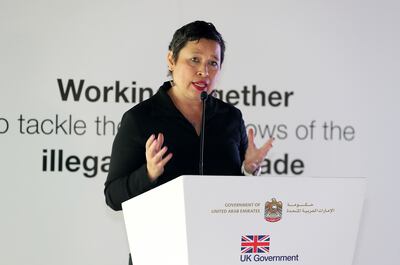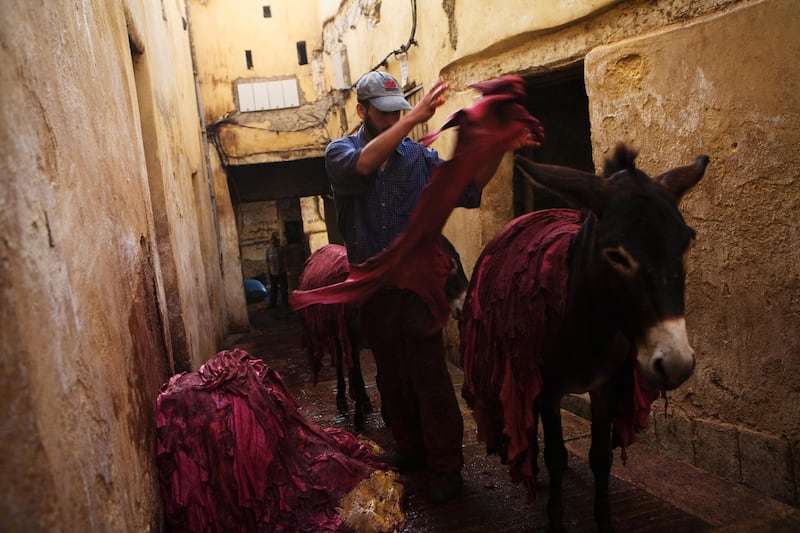A ban on the trade of donkey skins announced by the African Union could set a precedent for curbing illegal wildlife trade through the Middle East, conservationists said.
The continental ruling was agreed on at the 37th African Union Summit in Ethiopia, banning the trade in all 55 nations.
The Middle East and North Africa region is a key transit route for trafficked wildlife, with skins typically exported to the Far East to be used in alternative medicine. The funds are often funnelled into illegal criminal networks.
About 75 per cent of the world’s donkey population is found in Africa, serving as transport and carrying goods in rural areas.
But the trade in donkey skins has stripped rural working communities across the region of a vital component of everyday life, with animals slaughtered and skins sold to lucrative Asian markets.
Donkeys are often stolen from communities for ejiao, a traditional Chinese remedy used to reduce wrinkles and boost libido. It is made from collagen extracted from the animals' skins.
“The fact that this [ban] was approved at an African Union summit shows the political will to support wildlife issues like this,” said Jennifer Croes, a conservation scientist in Dubai and strategic adviser to the Interpol Wildlife Crime Working Group.
“An Africa-wide ban has never been done for any other species, yet the poor donkey – who people never would consider as wildlife – has gained this protective status.
“It shows how Africa is now showing leadership on tackling the illegal wildlife trade, whereas many western countries are not. This now needs to be taken outside of Africa, as other source countries are being targeted.”
Cruel trade
Ejiao trades for about $780 a kilogram in China, with high demand driving a 160 per cent increase in production since 2016.
Meanwhile, China’s donkey population has dropped from about 11 million in 1992 to under two million, according to the UN Food and Agriculture Organisation.
A trade route from Africa, where there are about 53 million donkeys, may have been closed off, but experts said challenges remained.
Harmonised shipping codes used globally help the World Customs Organisation (WCO) identify traded items using a six-digit number.
But donkey skins can be difficult to track as they are classed in the same 410120 number as all other equine and bovine skins, and do not have their own unique code.

“Our analysis of shipping databases has made us realise donkey skins may be exported from a much more diverse range of countries than previously recognised,” said Ms Croes, who also works with the UK Donkey Sanctuary charity.
“But there are also large gaps in this data. It appears many shipments are not recorded properly or HS code 410120 does not tell us whether a shipment is bovine skins or donkey skins.
“The question now is how this ban will be implemented and what the timeline is for enforcement. I am working with maritime and aviation sectors to encourage them to commit to a 'no donkey skins' carriage policy.
“This trade ban makes it easier for transport stakeholders to put measures in place or operating processes whereby they can actually say no to the carriage of donkey skins.”
If production of ejiao continues at the current rate, a minimum of 6.8 million donkey skins will be required by 2027, data shows.
Global crackdown
The illegal wildlife trade is estimated to be worth about $20 billion a year.
In August, the Emirates Group achieved IEnvA Illegal Wildlife Trade accreditation to acknowledge a commitment to taking action.
Wildlife awareness training has been carried out for Emirates SkyCargo and passenger services staff, including cabin crew, Emirates airport services and Emirates Group Security.
The training enables employees to identify signs of illicit wildlife trafficking in passenger and cargo operations.
Etihad also has a robust animal welfare and conservation policy to combat the illegal trade.
Interpol led a month-long crackdown on international wildlife trafficking in October, leading to 500 arrests and the seizure of 2,114 endangered species across 133 countries.
Authorities confiscated 30 tonnes of endangered plants and thousands of live animals as part of Operation Thunder that launched in 2017.
Following the money by monitoring suspicious transactions has become a key weapon in the fight against the illegal wildlife trade, including donkey skins.
In November, a multinational statement of principles was unveiled by financial intelligence units in Australia, Canada, New Zealand, South Africa, Singapore, the UK and US.
They became the first countries to support an international collaboration to detect and prevent financial activity that sustains wildlife crime.
Jonny Bell, director of financial crime compliance and payments at LexisNexis Risk Solutions, said traffickers actively hide illegal transactions by concealing connections within supply chains.
“Criminal organisations profiting from wildlife trafficking launder money by strategically placing transactions and front-end activities within legitimate business operations, complicating efforts to maintain the required risk visibility,” he said.
Mr Bell said financial institutions can leverage technology to detect wildlife trafficking transactions by screening clients and using existing transaction monitoring technology.
Suspicious transactions in diverse locations, card purchases abroad, casino spending and money remittances described as gifts are common red flags that warrant investigation.
Technology can also spot associations with individuals and organisations who have been linked to illegal trafficking.
“Determining whether wildlife trafficking transactions are on the rise is challenging,” said Mr Bell.
“However, we can see publicly that the number of convictions and the occurrences of seizures and interceptions suggests illegal wildlife trafficking is as prevalent as ever.
“Significant seizures in 2022 and 2023 indicate a return of the trade to pre-pandemic levels.
“The Middle East is a crucial trade route for air, land and sea, making it imperative for countries, governmental bodies and companies across this region to actively combat the illegal wildlife trade.”







